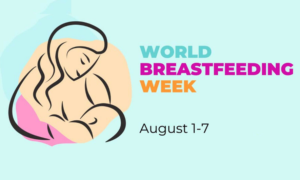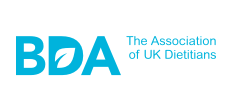
Student Article Series
World Breastfeeding Week: Dietetic Role and Support

What is breastfeeding?
Breastfeeding is the process whereby a baby is fed milk derived from their mother’s breast. Breast feeding can be done directly from the breast or by expressing the milk from the breast and bottle feeding. The NHS recommends exclusive breastfeeding for the first 6 months of a baby’s life (3)
Benefits and challenges of breastfeeding
Breastfeeding offers multiple benefits to the baby and the mother. Breastmilk meets all the nutritional needs of a baby as it provides macronutrients, micronutrients and antibodies. Antibodies protect the baby from infections, diseases and illness more so than formula milk. Breastmilk also adapts as the baby grows to meet their nutritional needs (4). Studies have shown that breastfeeding has a positive effect on allergy prevention and children’s IQ. Breastfed babies also benefit long-term as they have a lower risk of being overweight or obese and are less likely to develop diabetes later in life (5) (6).
Women who breastfeed are at reduced risk of breast and ovarian cancers (5) and studies have shown that mothers who exclusively and mixed breastfeed for 6-12 months are linked to less postpartum weight retention (7). Other benefits include the practicality of breastfeeding, such as saving money on formula and feeding supplies, and the availability of always having ready to serve milk at the right temperature.
As part of breastfeeding there are some challenges that will prevent or deter people from wanting to breast feed. Examples of this include tongue tie where the babies tongue movement is restricted which makes it difficult to breastfeed, pain in your nipples and breasts, low milk supply, poor baby weight gain, latching issues and reflux (8). With these challenges support is available from health visitors, midwives, GP and lactation consultants. Dietitians have limited input in breastfeeding advice for the mother as in the majority of cases general healthy eating is advised (9).
About 44% of infants 0–6 months old are exclusively breastfed (2)
Why might a dietitian be useful in breastfeeding?
Dietitians are not usually involved in patient care of mothers that are breastfeeding however they might be when they are supporting midwives, health visitors and family nurses, which would include supporting all mothers to breastfeed if they want to and are able to. Despite this they could have more input by using their nutritional knowledge to educate mothers on the advantages of breastfeeding (10).
For example, promoting this method due to nutritional benefits such as:
- Cow’s milk protein allergy is less common in breastfed babies than formula feed. However, if they do get this allergy dietitians can support that by advising on alternative products to ensure the mother’s diet is completely free of cow’s milk, this will enable them to continue breastfeeding (11).
- Nutrition provision within breastmilk. It is the optimum form of nutrition for babies which benefits the health of both the mother and baby (10).
- Reduced chance of childhood obesity by up to 25%, lowering the risk of developing other comorbidities linked to weight (12).
Involving a dietitian to support breastfeeding can decrease the likelihood of a child needing future dietary intervention by preventing malnutrition, excessive weight gain, allergies, and intolerances. Early interventions to support breastfeeding may include educational sessions, monitoring the weight of both mother and baby, and providing information leaflets on the benefits and reasons to breastfeed compared to formula.
Worldwide, over 820,000 children's lives could be saved every year among children under 5 years if all children 0–23 months were optimally breastfed (2)
Personal Experience of Breastfeeding
We spoke to Caroline Frascina. Registered Dietitian, who shared her experience of breastfeeding.
What was your experience with breastfeeding?
I breastfed both my children and this is something I always wanted to be able to do. Having twins definitely added additional challenges, both from the practicality of feeding two children at one time (sometimes call tandem feeding), or needing to take turns. My twins were also born 6 weeks premature which added additional complications as they were in neonatal intensive care for the first couple of weeks.
Why did you want to breastfeed?
I wanted to breastfeed for a few reasons, mainly the benefits to their health – reduces risk of infections, benefits to immunity, but I also wanted to from a practicality perspective e.g. being able to feed them wherever – I even took them to Crete at 4 months old and feeding them while travelling was realively easy and I was glad not to have to deal with sterilising and bottles etc.

What support did you receive through your journey of breastfeeding?
I had quite varied support in my breastfeeding journey. There were some brilliant staff who helped me in adapting to breastfeeding and trying different positions to make sure we were comfortable. On the other hand, when one of my girls lost weight, I was often encouraged to formula feed, before trying alternative solutions which was quite disheartening. In the end, with the support of a breastfeeding support worker, we came up with a solution to continue breastfeeding and supplementing using pumped breast milk and a nasogastric tube. With this help, my little girl gained the weight she needed to be discharged from hospital and we went from strength to strength.
Do you feel you would have benefitted from dietetic input in this breastfeeding journey?
For me, it would have been good to have had dietetic input onto the ward and in the community setting to promote breastfeeding – even if this wasn’t directly with me and my children, it might have been helpful to have this support for the wider team. Dietitians could have a really valuable role in promoting breastfeeding and supporting if there are additional challenges e.g. allergies (such as cow’s milk allergy).
Improving child development and reducing health costs through breastfeeding results in economic gains for individual families as well as at the national level (2)
Other health professionals involved in breastfeeding
Midwives and nurses
After birth, midwives and nurses are often the first healthcare professionals to support mothers with breastfeeding. This includes educating and preparing the mother on the positioning of the baby during feeding, the identification of potential challenges the mother may face and guidance on the frequency and quantity of feeds (13).
Lactation consultants
Lactation consultants can also have input in the care by addressing complex issues, reviewing high risk babies, completing oral assessments and supporting the midwives with more common issues (14). Lactation consultants of Great Britain is a charity to improve health and wellbeing for families who are breastfeeding. Included within this charity is midwives, health visitors, dieticians, GPs, paediatricians, infant feeding leads, peer support coordinators, NHS and public health project leads, academic researchers, peer supporters and members from every voluntary sector network, as well as independent lactation consultants (15),
69% of countries have community programmes that include Infant and Young Child Feeding counselling (16)
References
- World Health Organisation (2024) World Breastfeeding Week 2024. Available at: https://www.who.int/campaigns/world-breastfeeding-week/2024 (Accessed: 23rd July 2024).
- World Health Organisation (2023) Infant and young child feeding. Available at: https://www.who.int/news-room/fact-sheets/detail/infant-and-young-child-feeding (Accessed: 23rd July 2024).
- National Health Service (NHS) (2023) Your breastfeeding questions answered. Available at: https://www.nhs.uk/conditions/baby/breastfeeding-and-bottle-feeding/breastfeeding/your-questions-answered/ (Accessed: 23rd July 2024).
- National Health Service (NHS) (2023) Benefits of breastfeeding. Available at: https://www.nhs.uk/conditions/baby/breastfeeding-and-bottle-feeding/breastfeeding/benefits/ (Accessed: 23rd July 2024).
- World Health Organisation (WHO) Available at: https://www.who.int/health-topics/breastfeeding#tab=tab_1 (Assessed: 23rd July 2024).
- Shamir R. The benefits of breast feeding. Protein in neonatal and infant nutrition: recent updates. 2016;86:67-76.
- Jiang M, Gao H, Vinyes-Pares G, Yu K, Ma D, Qin X, Wang P. Association between breastfeeding duration and postpartum weight retention of lactating mothers: A meta-analysis of cohort studies. Clinical Nutrition. 2018 Aug 1;37(4):1224-31.
- The Breastfeeding Network (2024) Breastfeeding challenges. Available at: https://www.breastfeedingnetwork.org.uk/breastfeeding-information/problems-with-breastfeeding/ (Accessed: 23rd July 2024).
- National Health Service (NHS) (2022) Breastfeeding and diet. Available at: https://www.nhs.uk/conditions/baby/breastfeeding-and-bottle-feeding/breastfeeding-and-lifestyle/diet/ (Accessed: 23rd July 2024).
- British Dietetic Association BDA (2018) Breastfeeding Policy Statement. Available at: https://www.bda.uk.com/resource/breastfeeding-policy-statement.html (Accessed: 23rd July 2024).
- The Breastfeeding Network (2024) Cows milk protein allergy and breastfeeding. Available at: Cows’ Milk Protein Allergy (CMPA) and Breastfeeding – The Breastfeeding Network (Accessed: 23rd July 2024).
- UNICEF (2019) A World Health Organization (WHO) study of 16 countries across Europe has found that breastfeeding can cut the chances of a child becoming obese by up to 25%. Available at: Breastfeeding reduces child obesity risk by up to 25%, WHO finds – Baby Friendly Initiative (unicef.org.uk) (Accessed: 23rd July 2024).
- World Health Organization. The role of midwives and nurses in protecting, promoting and supporting breastfeeding: advocacy brief.
- Lactation consultants of Great Britain (2017) WHO’S WHO IN BREASTFEEDING SUPPORT & LACTATION IN THE UK. Available at: https://usercontent.one/wp/lcgb.org/wp-content/uploads/2018/02/Whos-Who-2017-Oct-17-1.pdf (Accessed: 23rd July 2024).
- Lactation consultants of Great Britain (2024) About lactation consultants of Great Britain. Available at: About LCGB – LCGB (Accessed: 23rd July 2024).
- UNICEF (2023) Global Breastfeeding scorecard. Available at: https://www.unicef.org/media/150586/file/Global%20breastfeeding%20scorecard%202023.pdf (Accessed: 23rd July 2024).



